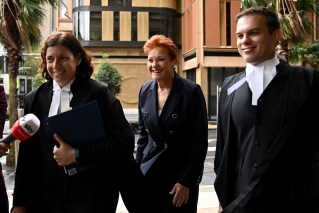Albanese’s first 100 days have been faultless, but tax cuts might trip him down the track

So far, so good.
Not much else can be said about a Prime Minister’s first 100 days; not much can get done in such time. (Except by Gough Whitlam who, an old joke goes, rested after seven days).
It is an arbitrary American marker beloved by political journalists.
PMs usually at least seem to be travelling well so early on when the honeymoon even extends to the media. But Anthony Albanese’s record approval ratings are a sign of an innings played near-faultlessly albeit on a politically easy wicket.
But it’s the long-term work that will define the government. Speaking at the National Press Club on Monday, Mr Albanese’s authority seemed to waver seriously for the first time in the 100 days since his election, and it point to his most serious challenge when early goodwill inevitably evaporates.
An international hit
Mr Albanese’s earliest and most significant success has been in foreign affairs.
From his debut at the Quadrilateral Security Dialogue days after the election, he showed himself at ease on the world stage as the government took a new tack on diplomacy.
The most significant moment in a recent fortnight of Parliament, the passage of a bill enshrining a 43 per cent climate reduction target passing the lower house, has become a feature of foreign policy too.
Climate policy was the basis for renewed relations with America and the Biden administration, but also with Australia’s newer security partners.
In the Pacific we received a warm reception too – but despite an embrace from its leader, the Solomon Islands is still moving into Beijing’s orbit which means Australia’s main security challenge unchanged. Repaired relations with France have extended our reach in the region immeasurably.
One insider said Mr Albanese’s foreign policy achievements were about doing as much as possible while changing the tone, but not the underlying policy foundations of his predecessor.
At times on Monday that sounded like a knock that could be applied to the rest of his platform too.
Morrison’s shadow
More than any in recent memory, Scott Morrison’s legacy has cast a long shadow over the Albanese prime ministership – mostly to his advantage.
Mr Albanese’s leadership style has answered problems of public confidence that arose during and after his election. The government has taken unusual care to include independent MPs when negotiating the climate bill and to involve their constituencies.
The response to the Morrison ministries scandal, meanwhile, has been about protecting the legitimacy of democratic traditions, with an inquiry but also drawing a line and publicly condemning Mr Morrison for violating them.
That kind of criticism invites scrutiny. The government obviously feels it is vulnerable to the characterisation of Mr Albanese as too negative for a PM because it is one his speech sought to anticipate.
“Governing is bigger than cleaning up after your predecessors and more than reacting to events,” he said. “We are willing to look at the hard questions, to face up to the big challenges, to embrace the need for real reform.”
The PM sounds much less convincing on the question of his own agenda and whether it fits this lofty bill.
After all, “real reform” sounds like boilerplate, but it is not something any PM has achieved since John Howard’s second term and its perceived absence has been fatal for previous PMs.
The vision thing
There is plenty for the government yet to do. There have been only two weeks of Parliament so far which has left it behind its own schedule for creating a multi-billion dollar manufacturing fund.
Aged-care reforms; an anti-corruption commission; a move to universalise child care as a public service; plans to reshape our electricity grid for the renewable age are still on the list.
What is to be done about the “cost-of-living crisis’’ is less clear.
And the prospects for workplace reform seem likely to hinge on this week’s jobs and skills summit.
But it will take time to see if any new agreement at the summit effects lasting change; a deal unions and small business reached on Monday rested on some unspecified details.
Even after he looks toward the long term, Mr Albanese’s plans still seems composed in no small part of ambitions like fostering consensus politics, something defined in opposition to the previous government.
“Not only does a culture of division and dysfunction and conflict create these kind of urgent problems in the short term, it stops our country building for the long term,” he said.
“This is why our government is focused on solutions, not arguments.”
This could be revolutionary but it could be nebulous.
Mr Albanese’s confidence seemed to fade completely on Monday when he painted himself as powerless in response to a question about mounting calls to break a promise and dump his support for the Coalition tax cuts benefiting the wealthy, and which represent a huge fiscal constraint on his platform.
Recent history suggests a government’s early achievements is not predictive of its longevity.
Kevin Rudd signed the Kyoto protocol and delivered the apology to the Stolen Generations inside his first months in office.
Less than one year after winning an election on a promise of raising public standards, Mr Howard had lost his seventh minister to an expenses scandal.








